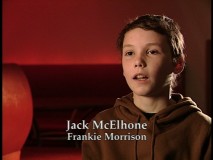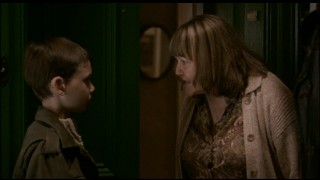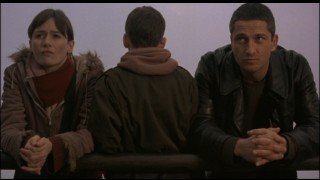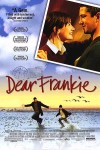By Aaron Wallace
Fortunately, Dear Frankie isn't the "romance about getting a second chance" that the packaging claims it to be. A tagline that clichι, if truly indicative, could present only a movie equally overdone. Of course audiences have generally come to expect a bit more from independent films that are both Miramax-distributed and festival-winning (it received nods in both Seattle and LA). The inspired drama that one finds instead is much more in keeping with those expectations.
The story is one of hardships. Young Frankie (Jack McElhone) is a deaf boy who has had to grow up not seeing his father, whose station on a ship has kept him away since Frankie was too young to remember. The absence hasn't kept father and son from knowing one another, though; a bond is kept alive through years of writing letters... or so Frankie thinks.


The truth is that it's Frankie's mother, Lizzie (Emily Mortimer), who receives the letters and writes replies, a deception she perpetuates with good intentions but also deep guilt. She has considered breaking the truth numerous times, but somehow the lie has managed to win out... that is until the ship she's made up for her husband in the letters turns out to be real and bound for a nearby port in Scotland and, even worse, Frankie has learned of the news first. Caught in a corner, she opts for desperation over honesty and seeks a stranger to play the part of Frankie's dad for just one day. The winning candidate for the role is a man known only as "stranger" (Gerard Butler), a mysterious figure with a surprisingly warm persona that intimidates Lizzie but manages to convince Frankie and fill a void in the yearning youngster's life. As the relationship between these three key players quickly rises to a level far more personal than employer, actor, and child, emotional tensions mount around an increasingly problematic truth.
McElhone, Mortimer, and Butler all deliver capably in their roles, which, by the film's end, are each as important as the other. Mary Riggans and Sharon Small, who play Lizzie's mother and friend/employer, respectively, add padding to an already heartfelt demeanor in the movie. Two other child actors, Sean Brown and Jayd Johnson, play the schoolmates most involved in Frankie's life. The former, Ricky Monroe, is something of a bully to Frankie, but that doesn't stop the pair from taking interest in one another. The latter is a girl named Catriona who is a true friend to Frankie but innocently leads him to trouble. The cast together makes for an impressive on-screen presence that is never over the top and never seeks to transcend the storyline. Jonathan Pender also deserves mention for his ability to lend Frankie, who is heard only through his thoughts in letters, a voice.
Like much of her cast, director Shona Auerbach is a relative newcomer to the film industry, but I'm pleased to say that it doesn't show. The direction and score both serve the movie dutifully, and Auerbach seems to have a knack for using the right shot at the right time to really hit home.
 |
DVD Details
1.85:1 Anamorphic Widescreen
Dolby Digital 5.1 Surround Sound (English, French)
Subtitles: English, Spanish
Closed Captioned
Release Date: July 5, 2005
Single-sided, dual-layered disc (DVD-9)
Suggested Retail Price: $29.99
Black Keepcase |
VIDEO and AUDIO
Presented in its proper 1.85:1 aspect ratio and enhanced for 16x9 displays, Dear Frankie looks great on DVD. The only problem one could find is that a few scenes look a bit softer or grainier than one might hope for, but this is minimally problematic, and likely only so on larger screens. Whether that has more to do with its DVD transfer or a low production budget, I'm not sure. In every other department, the video quality is quite pleasing.
The audio sounds pretty good too, although the Dolby Digital 5.1 track isn't very dynamic. The majority of sound comes from the center channel, while the rear channels and bass don't see much action. That makes sense, though, as Dear Frankie is a rather quiet film in which scenes of silence or subdued, elegant music are common. While it probably could have been slightly enhanced for the home theater enthusiast, it isn't in any way a distraction, and what is heard is clear and at an unobtrusive volume level. A French language track and Spanish subtitles are also included.



BONUS FEATURES, MENUS, and DESIGN
Auerbach's feature commentary is as standard as they come. It covers the usual range of topics pertaining to the film, but while its inclusion is appreciated, it's not particularly interesting. Fans of the film will want to listen at least in part, but it's safe to say that it doesn't stand out among DVD commentary tracks.
"The Story of Dear Frankie" is essentially a making-of-featurette, in which the director, cast, and various crew members come together to discuss the origins of the story and the production of the film. Those interviewed praise their co-workers' abilities quite a bit, but they generally get it right. Despite its short run time, there is some insight to be gained from this piece.
Eight deleted or extended scenes are included, which can be viewed individually or all at once. Most are pleasant but expendable, but there are a few that one wishes could have remained intact, particularly those that reveal a deleted subplot in which Ricky himself was bullied, with Frankie rescuing him. The best part is that each scene comes with the option of hearing the director's audio commentary, adding needed context to some of the isolated segments. One scene in particular benefits from the commentary, an extension of Lizzie and the stranger's first dance that took visual risks and fell under criticism from the "powers to be;" it's presented here for the viewers to decide.
The final feature is an interview with the director regarding her thoughts on the film from conception to debut. There's some repetition from the other features, while other information is new. The questions asked of her appear on the screen before cutting to the footage of her answers and explanations. This, along with the deleted scenes commentary and the making-of featurette, can serve as a substitute for listening to the feature-length commentary track in its entirety.
Opening the disc are previews for A Lot Like Love and Bride & Prejudice, along with the 25th Anniversary spot for Miramax. These can not be accessed from the 16x9 main menu, which is still and silent but functional nonetheless.


CLOSING THOUGHTS
Dear Frankie isn't likely to amaze, but it's certainly able to resonate with viewers, as is evidenced by its impressive track record in film festivals and movie reviews. This Scottish film is admirably executed with a cast that blends well with one another and with the prevailing mood. The DVD treatment leaves some room for improvement but is mostly satisfactory, especially given its lesser clout. Dear Frankie capitalizes on an interesting premise and does so with success and therefore earns a recommendation.
More on the DVD / Buy from Amazon.com

![]()









